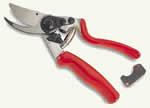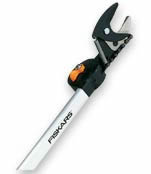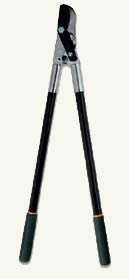Detailed and specific information on pruning trees.
Pruning is a vital part of plant and tree care. This task can be confusing so we developed the following guide to help you prune properly.
Three basic tools suffice for most pruning jobs: shears, loppers, and a pruning saw. Keep them sharp for clean cuts; disinfect after pruning diseased material.
- When Do Roses Need To Be Pruned?
- When Do Crepe Myrtles Need To Be Pruned?
- When Do Hollies Need To Be Pruned?
- When Do Butterfly Bushes Need To Be Pruned?
- When Do Hydrangeas Need To Be Pruned?
- When Do Clematis Need To Be Pruned?
- When Do Fruit Trees Need To Be Pruned?
- When Do Azaleas and Rhododendrons Need To Be Pruned?
- When Do Junipers Need To Be Pruned?
- When Do Flowering Trees Need To Be Pruned?
Prune in winter or early spring when plants are still dormant. Prune plants to maintain symmetrical bushes and to encourage strong new growth. Cut back all previous years growth as much as one-third its length. Remove branches that cross through center and remove plants understock. Also prune weak and dead stems as needed. This will also encourage strong new growth.
The best time to prune crepe myrtles is in February. Prune out twiggy stems and any dead wood. Thin out crossing or crowding branches in the plants center. If tree form, prune lower branches. Prune top to maintain symmetry. Each year after flowering, cut 12 to 18 inches off the tips of branches that have bloomed.
Prune in winter or early spring mostly to shape plants. Cut back wayward branches and prune out weak unproductive dead stems as needed.

Felco F-7 Pruner
Butterfly bushes bloom in summer on new spring growth. They can be pruned in late winter or early spring. By pruning old blooms you will encourage new flowers. Also prune out old dead and unproductive branches.
Hydrangeas fall into two groups. Some you prune in early spring and others after the flowers fade.
Early Spring Pruning
Hydrangeas bloom on new growth. These plants are Climbing Hydrangea, Annabelle, Grandiflora, and PeeGees.
After-Bloom Pruning
Hydrangeas bloom on last years stems. These include Bigleaf Hydrangeas, Oakleaf Hydrangeas, Lacecaps, SummerBeauty, and Nikko Blue. Pruning should be done when the flower has faded. Cut back the flowering stems to the strongest pair of new shoots. As plants mature, begin to thin out the oldest woody stems. Remove crowded crossing, broken, or dead branches
Clematis can be put in three categories: Spring-flowering, summer-flowering, and twice-flowering.
Spring-blooming
Clematis produce flowers on stems that grew during the previous year. Prune when flowers are done blooming. Cut back the flowers that are now dead. Prune out any old dead stems as well.
Summer-blooming
Plants bloom on new growth produced in the spring. Cut back stems before new growth begins. Late autumn or early spring is a good time to prune. Cut back about 12 inches of old growth. Each year the vine will grow larger and stronger.
Twice-blooming
Plants first bloom in spring on stems produced the previous year. Late summer or fall will be the next bloom time. In late fall or very early spring, prune lightly to thin the stems. After the spring bloom, prune more heavily for more healthy stems to develop for the next bloom. After a second bloom, prune old flowers away.

Telescoping Pruning Stick
The most common fruit trees are apple, peach, pear and cherry.
Apple Trees
Apple trees should be pruned in late winter or early spring before new growth starts. Always remove all suckers (summer is a great time). Also remove dead and other unproductive branches as needed.
Peach Trees
Peach trees are fast growing and need to be pruned in winter. Without pruning the peaches will grow farther away from the tree's center. This will put great strain on the branches, causing them to break. In winter, thin out upward-growing branches that cross in tree's center.
Pear Trees
Prune back in early spring. Always prune dead and unproductive branches as needed.
Cherry Trees
Prune in winter. Prune out branches that cross in center and dead unproductive branches as needed.
They can be pruned in winter or early spring. However pruning at this time will prevent plants from producing many blooms. The best time to prune azaleas and rhododendrons is just after their blooming period in spring. If you prune at this time, no additional pruning will be necessary.

Power Lever Bypass Loper
Junipers need very minimal pruning. They should be pruned to correct their shape, to accent their form, or to limit their size. This should be done during the juniper's growing stages in mid-summer.
Flowering trees should be pruned after they have finished blooming. Prune as little as possible. Dead branches, branches that cross in the center, and branches that are unproductive should be pruned out.
